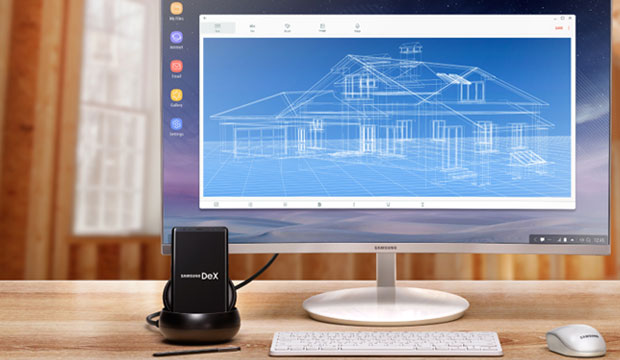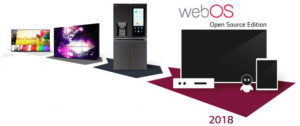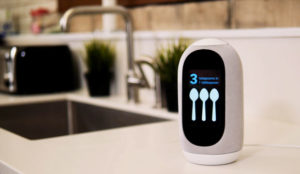Samsung on Thursday announced a new app, Linux on Galaxy, designed to work with its DeX docking station to bring a full Linux desktop experience to Galaxy Note8, Galaxy S8 and S8+ smartphone users.
Samsung introduced DeX earlier this year, a docking station that connects to a monitor to give Galaxy smartphone users a desktop experience.
With the Linux on Galaxy app, which is in the trial phase, users will be able to run full Linux desktop distributions.
Users can register with Samsung to receive an alert once the Linux on Galaxy app becomes generally available.
Samsung also announced new partnerships with several gaming developers. Fans will be able to play mobile games, including Super Evil Megacorp’s Vainglory, Game Insight’s Survival Arena, Eric Fromling’s BombSquad, and Netmarble’s Lineage 2 Revolution in an immersive desktop environment.
In addition, Lineage 2 Revolution and Nexon’s AxE are among the titles using the Vulcan application programming interface, according to Samsung, for more responsive performance and greater power efficiency. These games will be available on a full screen with full keyboard and mouse control.
Ian Fogg, head of mobile and telecoms at IHS Technology, noted that many attempts have been made to convert smartphones into desktop environments.
Motorola offered the Atrix in 2011. Microsoft later made an effort, but there were limitations in terms of the apps and content available to make the transition to a big screen.
Fogg told LinuxInsider that Samsung’s DeX environment is “supremely better than all the earlier attempts to have a smartphone docking into a big screen.”
He said the addition of the Linux on Galaxy app will give smartphone users “alternative environments when plugging into a big screen,” adding that its success will depend on how well the content and applications translate.
New Competition
The ability to run a Linux environment is “interesting at best,” said Jitesh Ubrani, senior research analyst at IDC.
The Linux on Galaxy app will appeal only to a “small subset of developers,” he told LinuxInsider.
Huawei recently introduced a similar capability for its Mate 10 mobile phones, Ubrani said, allowing them to be connected to a monitor and operated with a traditional mouse and keyboard. Unlike Samsung’s approach, the purchase of a separate dock is not required.
“The concept of docking a smartphone to provide a true desktop replacement has been tried by many vendors in the past and none have had meaningful success,” he noted.
“One of the common missteps taken by all these vendors is that this feature has been targeted as a premium experience for developed markets. In these markets, users can afford multiple devices and often prefer multiple devices because software and services haven’t been developed to truly take advantage of a docked smartphone,” Ubrani explained.
Al Gillen, group vice president for software development and open source at IDC, said it’s interesting to add the new Linux desktop capability.
However, he told LinuxInsider that the industry has failed to gain much traction with its efforts to use a smartphone as a workstation.
Gillen recalled that Microsoft had a product on the market a few years back, but that product was doomed—likely because it was a Microsoft system.
Samsung has far more momentum in the smartphone market, he pointed out.
Still, “the No. 1 challenge is that there is no public infrastructure for where you can dock your phone, other than in your home or office,” Gillen said. “Where you really would like to have that is at a hotel, at an airport, etc.”
Watching and Waiting
Gillen suggested that whether the open source community embraces this technology depends on how much work it has to do.
“If the upstream contributions to enable this are coming from Google or Samsung, then the community has — in effect — embraced this technology by default,” he said. If the community has to do something else before Google or Samsung can ship usable devices, then that would change the calculus.
Samsung’s approach is still very much “wait and see,” said Red Hat spokesperson John Terrill.
Its success depends on what an implementation would look like in the wild and how the Android kernel versus the distro kernel is handled, he told LinuxInsider.
“DeX enables Android to be productive as a desktop,” said Paul Teich, principal analyst at Tirias Research.
“That’s far more engaging than working with desktop Linux,” he told LinuxInsider.
Android as a desktop will allow a smartphone to completely bypass Windows, Teich noted.
He said a few open source users will likely opt for the Linux version, but he will favor Microsoft Office 365 on Android.
“I’ll predict that as soon as official ARM-based Windows 10 laptops start shipping, there will be video instructions available for re-imagining them with Linux,” said Teich.
“A real desktop is far more likely a target for open source advocates than messing with smartphones,” he maintained. “Much higher return on time spent.”























































The only reason I want Samsung to support Linux is that I want their phones NOT to use Android, but rather a secure pure Linux only on the phone! Adding an app to provide a Linux desktop experience is not at all what I want! And I don’t think there’s a single Linux fan who will disagree with me!
By the time you modify a "pure Linux" distribution to run usefully on a phone, you’ve probably just reinvented Android.
I disagree.
/Dave
Zero-toleranceM$ ~ Linux/BSD/Beos/Solaris user since 1997
I still use my Ubuntu phone and tablet, there’s Linux and a place for Android (still Linux). Buy yourself an Ubuntuphone if you want something, ‘more Linux’.
May I add grow a brain before speaking for people who share not the same propensity towards ‘dumb-arse’ness.